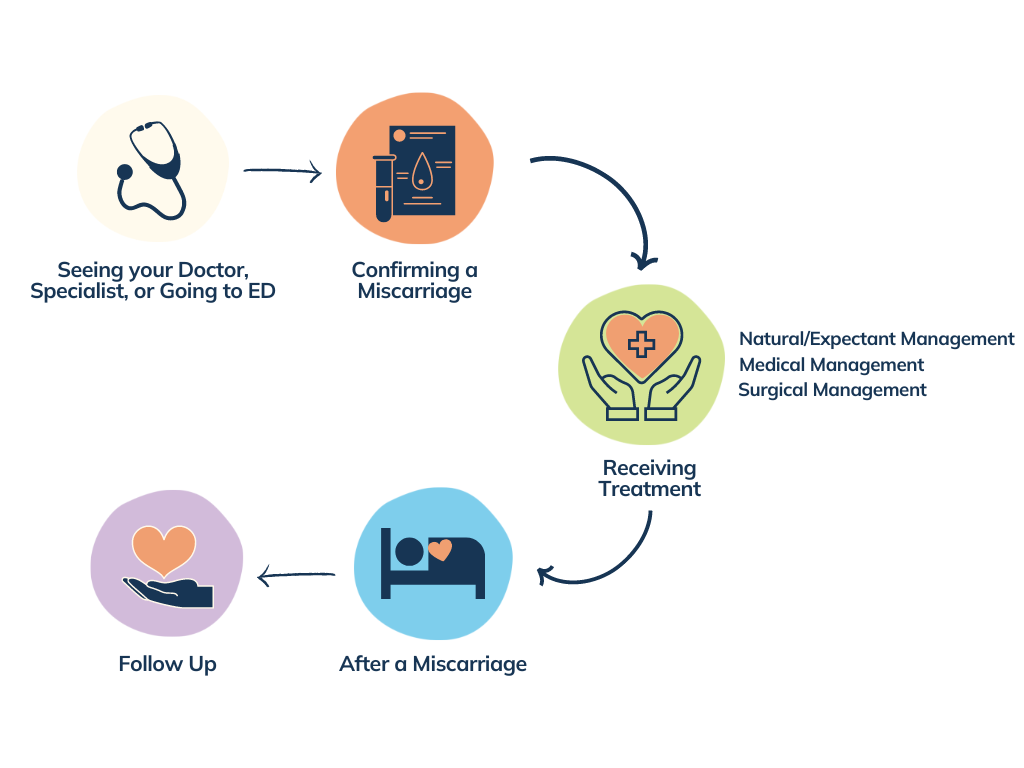It’s important to know that many women experience some vaginal spotting early in their pregnancies. This is not always a sign of an impending miscarriage. If you are concerned that you are having a miscarriage, call your doctor or specialist. If you are unable to contact them, you may prefer to just go straight to the local hospital emergency department.
If you are pregnant and experiencing heavy bleeding, severe cramping, and/or feeling very unwell, please go to your local emergency department, or call 000 immediately.
Emergency departments are busy places with long wait times. A triage nurse will evaluate your condition and the urgency of your symptoms. Your pain and blood loss level will help determine how quickly you need to be seen by a doctor.
What should I do if I think I’m having a miscarriage?
The treatment you undergo will depend on the type of miscarriage you experienced and the services available at the time of your miscarriage. Whether you found out that you’ve miscarried after having symptoms or whether it was during a routine antenatal check-up, the pathway below may show what happens next. As a public patient, you are likely to see several different healthcare providers throughout your care, in comparison to private patients who will generally see the same private obstetrician.

Seeing your Doctor, Specialist or Going to ED
The pathway to care will depend on whether you have had your pregnancy confirmed and whether you have made a choice about who will manage your pregnancy.
Seeing your doctor or specialist
Whether you are a public or private patient, if you are experiencing symptoms of a miscarriage the first person to see is your doctor or specialist.
Depending on your situation and the services available you may be referred to an Early Pregnancy Assessment Service or the local hospital’s Emergency Department. Your doctor may suggest you see your specialist (if you have one).
Going to the Hospital
Sometimes it is not possible to see your doctor or specialist. Depending on your symptoms you may prefer to go straight to the local hospital’s Emergency Department. Once you arrive at the ED a triage nurse will assess you. Your pain and blood loss level will help determine how quickly you need to be seen by a doctor. The nurse may also order some initial blood tests and, if available, an ultrasound before the doctor sees you.
Before leaving for the hospital, you may want to pack a self-care bag. An overnight bag is handy, although unlikely to be needed. It’s a good idea to bring:
-
- Your Medicare card
- Sanitary pads
- Toiletries
- Dressing gown or something warm to wear
- Slippers or easy to put on shoes
- A water bottle
- Your phone and charger
- A book/magazine/iPad/tablet
- A spare set of comfortable clothes to wear going home.
ED protocols can be confusing when you are unsure of what is happening with your pregnancy and your body. If you are not bleeding heavily or in immense pain (e.g., you have spotting or light bleeding), you may be triaged by the doctors as a lower priority than others. This could mean a long wait time in the ED. While waiting, if your pain or bleeding gets worse or you feel like you need to go to the toilet, let the hospital staff know immediately.
Undergoing blood tests and ultrasounds
To help work out if you are having a miscarriage, you may need blood tests, a pelvic ultrasound or both. These results will assist your doctor or specialist to determine the next step.
- Blood Tests – Usually, the blood test will measure your hCG hormone levels. hCG is produced by the developing placenta and can be detected in your blood and urine during pregnancy.
- Ultrasound – An ultrasound will be done to check if the pregnancy is in the womb. Once confirmed, the sonographer looks to see if your baby has started to form and checks if there is a heartbeat.
Your doctor or specialist may wish to track your hCG levels to see what is happening. If they confirm a miscarriage, they will discuss treatment options.
Receiving treatment for miscarriage
If tests confirm you are having a miscarriage there are three options for treatment: Natural/Expectant Management, Medical Management, or Surgical Management. You can learn more about the different types of treatment by clicking on the links below. It’s very important to take care of yourself both physically and emotionally after a miscarriage.


